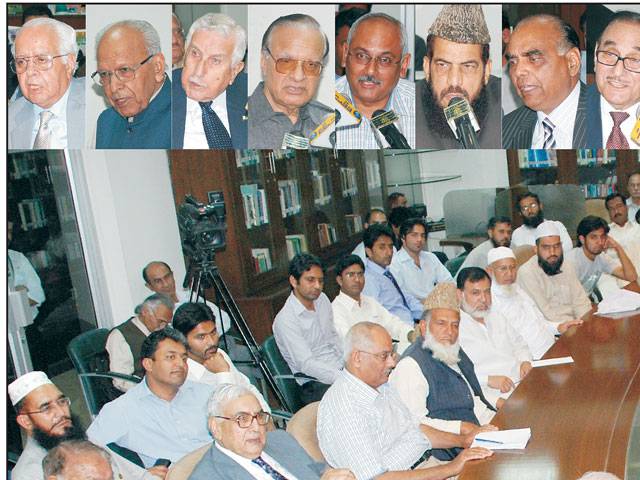LAHORE – Reiterating his stance that India cannot digest an independent and economically strong Pakistan, TheNation Editor-in-Chief and Nazaria-i-Pakistan Trust Chairman Majid Nizami has asked the people to be ready for a war with the neighbouring country on water issue.
“Indian hostilities and conspiracies against the country will never end until she will be told a lesson,” he held while presiding over a sitting on “Pakistan-India relations; Our rulers’ new wishes” at Aiwan-e-Karkunan Tehrik-e-Pakistan here on Saturday.
NPT Vice Chairman Dr Rafique Ahmed, Pakistan Movement Workers’ Trust Chairman Colonel (R) Jamshed Ahmed Tareen, former foreign secretary Shamshad Ahmed Khan, JUP Secretary General Qari Zawar Bahadur, Air Marshall (R) Khurished Anwar Mirza, Brigadier (R) Hamid Saeed Akhtar, JI Lahore Chief Ameer-ul-Azeem, Dr Munawar Sabir, Dr MA Soofi, Chaudhry Naeem Hussain Chattah, Naseeb Ullah Gardezi, Shafi Josh, Colonel (R) Ikram Ullah, Professor Muzaffar Mirza, Rafique Ghori, Sadiq Jarral, Yasin Watoo, Shahid Rasheed, Rafaqat Riaz and people from different walks of life attended the session.
The sitting was jointly organised by NPT and PMWT on the proposal of Majid Nizami.
Presenting track record of India’s bad plans and atrocities against Pakistan from Water and Kashmir issues to terrorism in Balochistan and separation of East Pakistan, the NPT Chairman stressed that war was the only solution to resolve these problems.
He regretted that the rulers, past and present, never followed the Quaid’s vision towards making Pakistan an Islamic welfare state. “Had General Grassy following the Quaid’s order entered army into Kashmir, the situation would have been different”, he said. However, he said that the separation of East Pakistan to form Bangladesh was to some extent, a fault of the people of Pakistan, but Indian role was fundamental.
“We can compete India only by making Pakistan according to the vision of Allama Iqbal and Quaid-e-Azam Muhammad Ali Jinnah,” stressed Majid Nizami. He asked the rulers to be courageous and fight for the cause of Pakistani people.
Shamshad Ahmed, speaking in the context of the formation of foreign policy by parliament, held that policy making was not the job of the parliament but of the government.
He said that parliament made legislations but here the government had assigned it to format policies only to save its own face. He stressed that emotions should not overlap in the making of foreign policies and the recent steps for normalising relations with India were being taken by the government on American pressure. He added that Pakistani industry would be destroyed after free trade with India.
Dr Rafique held that trade with India was a conspiracy to stop the country’s development, regretting that the rulers did not thoroughly study about national matters.
Jamshed Tareen opined that rulers were weak in securing national interests, and a courageous leadership was the need of the hour.
Khursheed Anwar said that India could not wage an open war on Pakistan as it too was an atomic power, therefore it was hatching conspiracies to destabilise the country.
Dr Munawar Sabir, an educationist and professor at Punjab University, held that Kashmir was the core issue between the two countries and without settlement of this issue relation with the neighbour country was not viable.
He also rebuffed the trade with India until the settlement of the Kashmir dispute which he said was the jugular vein of Pakistan. He expressed surprise on how India could offer to export electricity having shortfall of hundreds of megawatt in its own grid.
Speakers stressed for the unity among people of Pakistan to develop the country as an Islamic welfare state according to the dream of Quaid and Iqbal.
Saturday, April 20, 2024
War with India inevitable: Nizami

Pak economy improving, funds will be provided on request: IMF
9:57 PM | April 19, 2024
Minister advocates for IT growth with public-private collaboration
9:57 PM | April 19, 2024
Judges' letter: IHC seeks suggestions from all judges
9:55 PM | April 19, 2024
Formula 1 returns to China for Round 5
9:05 PM | April 19, 2024
Germany head coach Julian Nagelsmann extends contract till 2026 World Cup
9:00 PM | April 19, 2024
A Tense Neighbourhood
April 19, 2024
Dubai Underwater
April 19, 2024
X Debate Continues
April 19, 2024
Hepatitis Challenge
April 18, 2024
IMF Predictions
April 18, 2024
Kite tragedy
April 19, 2024
Discipline dilemma
April 19, 2024
Urgent plea
April 19, 2024
Justice denied
April 18, 2024
AI dilemmas unveiled
April 18, 2024
ePaper - Nawaiwaqt
Advertisement
Nawaiwaqt Group | Copyright © 2024





